- Home
- Bryce Courtenay
Four Fires
Four Fires Read online
BOOKS BY BRYCE COURTENAY
The Power of One
Tandia
The Night Country
Jessica
Smoky Joe’s Cafe
Four Fires
THE AUSTRALIAN TRILOGY
The Potato Factory
Tommo & Hawk
Solomon’s Song
Bryce Courtenay
FOUR FIRES
McArthur & Company
Toronto
First published in Canada in 2002 by
McArthur & Company
322 King Street West, Suite 402
Toronto, ON M5V 1J2
www.mcarthur-co.com
Further information about the author can be found at
www.brycecourtenay.com
Copyright © Bryce Courtenay 2001
All rights reserved. Without limiting the rights under copyright reserved above, no part of this publication may be reproduced, stored in or introduced into a retrieval system, or transmitted, in any form or by any means (electronic, mechanical, photocopying, recording or otherwise), without the prior written permission of both the copyright owner and the above publisher of this book.
National Library of Canada Cataloguing in Publication
Courtenay, Bryce, 1933-
Four fires / Bryce Courtenay.
ISBN 1-55278-391-X
I. Title.
PR9619.3.C598F69 2003 823 C2003-904063-1
eISBN 978-1-77087-040-6
Maps on pages 994-5 based on maps by Don Wall and information from Lynette Ramsay Silver
eBook Development by Wild Element www.wildelement.ca
This book is dedicated to all the soldiers of the 8th Australian Division, especially those who were sent to Borneo and did not come home
There are four fires of our dreaming.
The bushfire of our land’s renewal.
The war fire of good men killing.
The soul fire of a different God.
The fires of a consuming love.
They are the bitter/sweet
chalice from which we
all drink and which,
in turn, make us
what we are.
These
fires
of
the
white fella’s dreaming.
BOOK ONE
1955–1956
CHAPTER ONE
When we were kids, my dad never talked about the war, not even on Anzac Day, when, like every other bloke he wore his medals and marched behind the high-school band to the rotunda at the top of King Street on which the names of the dead had been inscribed.
If Tommy happened to be in gaol on the big day, the governor let him out and he’d say nothing when our mum brought him back legless in the garbage truck that night. She had saved up a few quid for him to blow on grog and two-up and you could count on him coming back penniless and pissed.
Most of the other kids at school knew a bit about what their dad did in the war, but we five Maloney kids only knew stuff everyone knew, like the fall of Singapore and we Australians being taken prisoners of war by the Japanese.
Tommy, which was what we called our father among ourselves, taught us this poem. He was a bit of a bush poet in his day although he never claimed it was his own.
Singapore
A mighty island fortress
The guardian of the East
Impregnable as Gibraltar
A thousand planes at least
Simply can’t be taken
Will stand a siege for years
We’ll hold the place forever
And show our foes no fears
Our men are there in thousands
With defences quite unique
The Japanese didn’t believe us
And took it in a week.
The other thing Tommy told us before he clammed up permanently was different, but couldn’t be used for fear of being mocked. He once told us that in Borneo, if you dug a hole in the ground miles from a river or a creek and it filled with rainwater, because it rains in the tropics every day, in three days you’d have fish six inches long. Another thing he told us was that in the jungle the sudden rainstorms came down so fierce that lightning smashed down tall trees. That was okay but he told us about this one Pommie prisoner of war who was having a piss in the middle of the rainstorm and the lightning aimed for his piss-stream and ran up it like a welding arc and electrocuted him on the spot, flames shooting out of his body like a Guy Fawkes Night bonfire.
Fish that came from nowhere, out of thin air, now that had to be bullshit. You couldn’t skite about something like that when your commonsense said you’d get howls of derision from your mates at school. The lightning also, electrocuted through your piss-stream, why didn’t the lightning just strike him dead? I mean, c’mon? Tommy must think us kids are idjits!
You couldn’t even insist that your dad told you, like use his authority to confirm the truth. If your dad was on the council or the publican or someone important and you said he’d told you, well, your mates might have to think twice about doing a mock. But Tommy Maloney carried no authority whatsoever (except when the bushfires threatened), and was known by one and all to be a thoroughly unreliable witness.
Us Maloneys had a bad reputation in Yankalillee, which wasn’t entirely fair, but then things in small towns seldom are. Sergeant Donovan once told Nancy, our mum, that never you mind, there were a lot worse than us around.
Maloney is an Irish name and we were Catholics but we didn’t go to St Stephen’s, the Catholic school, which meant we weren’t just Micks but dirt poor as well and couldn’t afford the fees. Nancy said she probably could have talked to them but she was buggered if she was going to go cap in hand to anyone, even to His Holiness the Pope or his local representative, Father Crosby. Later I came to understand it was because of the nuns. Nancy was afraid that because she’d had four of us out of wedlock, the nuns would have a go at us and make things miserable. This act of independence and protection in the face of hardship made us one of only a few Catholic families at the local state school, which was not a good situation to find yourself in, but probably not as bad as the nuns being against you.
I didn’t see it at the time, kids don’t, but now when I look back I can see why being Church of England was somehow many notches up from being a Catholic. Nineteen fifty-five was just about the last gasp of the old colonial system where Catholic and Protestant were separated by what Nancy called ‘the great divide’, which had begun long before the first convicts of either religion reached Australia.
Ireland has always been the racial malignancy in the English bloodstream and it continued to manifest itself in country towns in Australia where, after five generations, the Pope and the Queen were still at loggerheads.
But around this time the great influx of poor European migrants started to arrive and small country towns such as Yankalillee found themselves having to deal with people whose names ended in ‘ic’, ‘vitch’, ‘zak’, ‘zov’ and ‘ski’, strange folk who stumbled and tripped over perfectly ordinary words in our mother tongue. They were called ‘reffos’ and people said they’d been through a hard time and were willing to do anything to get on.
One girl in my class, her name was Anna Dombrowski, but we called her ‘Anna Dumb-cow-ski’ because she talked sort of slow and her English words were pronounced funny, she once stood up in class and told us her family had been in a concentration camp in Pooland.
I remember Crocodile Brown, our teacher, shook his head slowly, then said how terrible it was and how her fa
mily had suffered enough and he hoped Australia would be different for them now they were safe. ‘Them’ was only her and her mum because her dad was dead.
That afternoon Bozo and me were building a billycart from four pram wheels we’d collected. ‘What’s a concentration camp?’ I asked him.
He considered for a moment, ‘It’s where they send you to learn to concentrate,’ he said at last.
‘It’s in Pooland,’ I said.
‘Yeah? Pooland?’ You could see he’d never heard of the place, but then he decided he had the answer, ‘Yeah, well, what do you expect, it’s like us, we get into the poo in class when we’re not concentrating.’ Normally he would have said ‘shit’, ‘we get into the shit’, and he seemed pretty pleased with the answer he’d invented. You could never tell with Bozo, sometimes he came up with things you didn’t think he ought to have known, maybe this was one such occasion.
‘But a whole camp. They got sent to a camp in Pooland for punishment! Imagine that, eh. We only get sent to stand in the corner and don’t even get the strap for not concentrating.’
‘Yeah, well, they must have been really bad,’ he said, in an offhand sort of way. I could see he’d lost interest.
‘Yeah, they suffered terribly, but Crocodile Brown said he hoped Australia would be different for them now they were safe.’
‘Course it will, stands to reason. We’re different see, we don’t have to concentrate that much.’
Maybe I should have asked Sarah or Mike. Bozo didn’t even know where Pooland was on the dented tin ball that had a map of the world printed over it, which we’d found in somebody’s garbage.
With migrants settling in the town, we had a reason to feel racially superior for the first time, that is if you don’t count the Abos, who didn’t really count because my greatgrandpa and his mates had chased them all off, got rid of most of them.
Catholic Australians were automatically bumped up a notch in the social pecking order and the migrants assumed the all too familiar bottom rung on the ladder. The Bonegilla Migrant Camp was only twenty-five miles down the road and we had a fair few migrants choose Yankalillee. Only it turned out they didn’t choose us, they were just sent by the government, told that’s where they had to go. The government said we had to call them ‘New Australians’but most people called them ‘reffos’or ‘dagoes’, or if a woman was in polite company she’d call them ‘people from away’. Anyway, they were fresh victims to exploit and an opportunity for even the Micks to participate in. We heard stories of how some of them were doctors and professors in their own country and were now forced to work on the Snowy Mountains Scheme because their qualifications weren’t recognised in Australia.
We concluded that if people who were doctors and professors elsewhere became council workers here, some even ditch-diggers, then our Australian standards had to be vastly superior to anywhere else in the world. We all felt a bit smarter as a consequence.
It was Bozo who first came up with this theory of how clever we were and, while I liked the idea a lot, I was forced to challenge it. If you were going to use a fact like that at school you had to be able to back it up. After all, if Tommy wasn’t a burglar he’d be about your average ditch-digger standard and he couldn’t have been a professor or doctor by any stretch of imagination.
‘Prove it, who’ve we got?’ I demanded.
‘Don Bradman!’ Bozo said, quick as a flash. I was convinced.
There must have been something to the theory, because even Irish-Catholic Australians with almost no standards to speak of were getting jobs in the lower echelons of the bureaucracy.
If those were hopeful times, with a lot of traditional attitudes changing after the war, reconciliation comes slowly in the bush and, I dare say, if you scratch the irritation, you’ll still find pockets of the old malignancy that exist to this day. The ancient quarrel between Protestant and Catholic is a scabious wound-in-waiting, still capable of producing pus and pain long after those ditch-digging migrants and the clever children they gave us became proper Australians and doctors and professors once more.
Though I have to say, all this social upheaval and toingand-froing of people didn’t seem to affect the Maloney family’s status in Yankalillee. Our family had one foot planted firmly in the dirt at the base of the social ladder while the other was still poised in the air above the first rung. We were Micks who lived in Bell Street and we didn’t have a government job, although Tommy spent a good deal of his life within the confines of a government institution.
The warders at the gaol were almost to a man, Catholics. So were the nurses and workers at the mental hospital, who were pretty thick, the men mostly drunks and the women pill addicts. Nancy said that the things that went on there you wouldn’t read about.
The nurses at the Old People’s Home were Catholics though the main doctor there, Dr Hughes, was an Anglican but he was also a town doctor who only visited the home if some old person was sick or dying.
The bush-nursing hospital was different though. It was perfectly okay to be a Protestant and a nurse. Pure nursing, or a nurse’s aide, was sort of at the lower end of the top and not the top end of the bottom, not like a psychiatric nurse in the mental asylum where all the loonies lived. The matron, Sister Baldwin, was also a Protestant and all-powerful. The two town doctors, old Dr Hughes and young Dr Wallis, were both Protestant and sort of above any particular ranking because all doctors were automatically important and above suspicion. There was a consistent rumour that old Dr Hughes was giving the whisky bottle a bit of a nudge and had given up evening surgery, but most people didn’t want to believe this, even if it was true. Doctors sort of got taken off the gossip list.
The fact that the largely Catholic institution workers were also government employees with guaranteed employment and regular salaries that made a huge contribution to the prosperity of the town, seemed to make little difference to the Yankalillee interdenominational pecking order.
The respectable jobs, with few exceptions, were owned by the Protestants, mostly the Anglicans and the Presbyterians. There were seven pubs along King Street which isn’t all that long, six of them owned by Protestants and one by a real Irishman, Mickey O’Hearn from County Cork. Nancy said a drunk could be thrown out of one, dust himself off, and, just by standing up, find himself miraculously at the bar in the next pub with a beer already poured and waiting for him. Everyone was drinking themselves to death in this sanctimonious little bush town.
The shire president, Councillor Evans, was Church of England and all the elected shire councillors as well, except for Mickey O’Hearn, a good Catholic, who was supposed to represent the common people like us, but who was outvoted on every issue he ever proposed. The shire councillors were the important people in the town and surrounding district; what they wanted was what we got and no more questions asked thank you very much.
There was always a Yerberry, Yankalillee’s first family. Their grandfather, Joseph Yerberry, founded the soft-drink bottling plant. Mrs Yerberry wore a fur stole, a hat with a colourful feather from a partridge tail sticking out of it, and white gloves to every occasion, summer or winter, while Harry Yerberry drove the latest Packard, always the same shit-brown colour.
Then came the grazier families, the real big hats in the district, foremost among them the Barrington-Stones, who had a Piper Cub and once entered a horse in the Melbourne Cup that came last. Still, it was a great honour to make the cut. There were always one or two grazier families who, in the high-handed manner of aristocrats, guarded over their own self-interests and took turns to be on the council.
Next came the orchardists at Stanley, the Andersons (cherries) and the McNuttys (apples). Then the small land-holders (sheep or cattle) who were mostly soldier settlers and only sometimes managed a representative. They were resented by the other farmers because they only paid three-quarters of one per cent on their government loans, which meant they just s
craped onto the bottom end of the acceptable list whether they were Protestants or not.
Most of these leading citizens undoubtedly belonged to the Masonic Lodge, a single-storey red-brick building next door to the Mechanics Institute hall. The window panes of the lodge were painted in white, and had bars across them, while the double doors were always chained and locked. What went on in there was a mystery, but if you were a Catholic you couldn’t belong because, Nancy told us, whatever it was they did, it was the devil’s work. They also had a secret handshake nobody knew except themselves and they used to scratch each other’s back, she said.
In the town proper Philip Templeton (note one ‘l’ in Philip), the Holden dealer, then either Tim McRobertson or James Hayley from McRobertson–Hayley Solicitors and Conveyancing, and Hamish Middleton, the town’s jeweller, ‘where everyone buys their wedding gifts’, were also members of the council. The town chemist, Bluey Porter, was once a member and although he was a Protestant and even sometimes played organ in church, he was an inebriate, because only Catholics were drunks, so the rest of the council eventually put the kybosh on him being a member.
The owner of the local rag didn’t make it either. The Owens & Murray Gazette was owned by Toby Forbes who, Nancy said, was rough as guts. ‘After him, Tommy’s almost a gentleman,’ she’d say, while scoffing at something he’d written in the Gazette. There must have been something that went on between the two of them once, because there were lots that were worse than Toby Forbes in town and he didn’t seem such a bad bloke. Sometimes, when he had a special edition coming out, he’d pass by the house and see if we wanted to do a paper run with the garbage in the morning, and he always paid cash on the knocker.
Vera Forbes, Toby’s wife, had social pretensions and wrote a weekly column in her husband’s paper called ‘Yacking On’, which was a feeble enough play on the town’s name. She also acted as a reporter and was able and willing to dish the dirt on everyone who wasn’t on the Anglican Women’s Guild. She was often referred to by those of us at the bottom end of town as ‘Big Mouth Saggy Tits’. She’d wear these dresses in the summer without a brassiere and you could see her tits through the material, they hung nearly to her waist without sticking out much either. Mike called them razor strops.

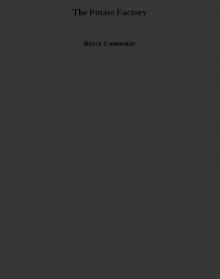 The Potato Factory
The Potato Factory The Power of One
The Power of One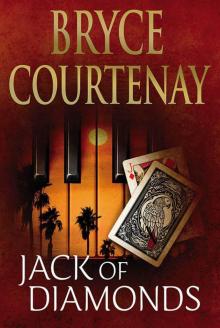 Jack of Diamonds
Jack of Diamonds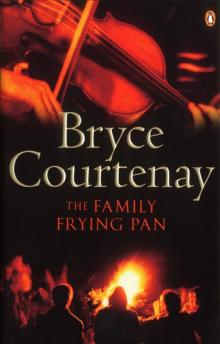 The Family Frying Pan
The Family Frying Pan April Fool's Day
April Fool's Day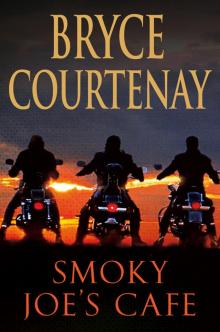 Smoky Joe's Cafe
Smoky Joe's Cafe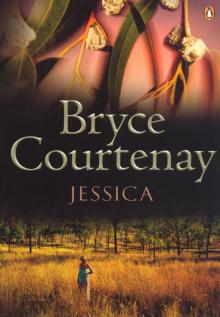 Jessica
Jessica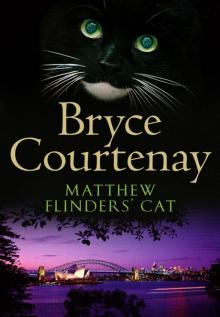 Matthew Flinders' Cat
Matthew Flinders' Cat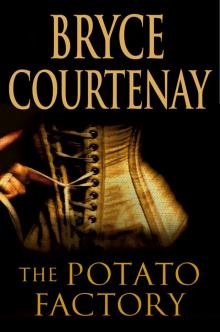 Potato Factory
Potato Factory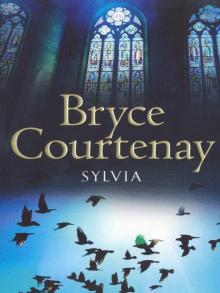 Sylvia
Sylvia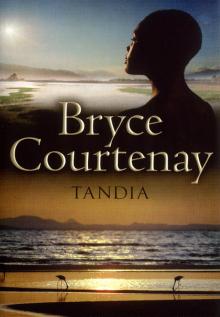 Tandia
Tandia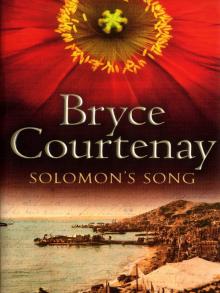 Solomon's Song
Solomon's Song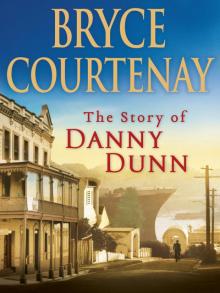 The Story of Danny Dunn
The Story of Danny Dunn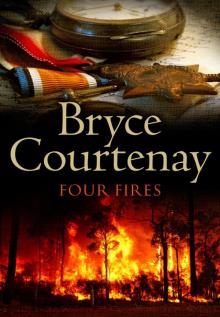 Four Fires
Four Fires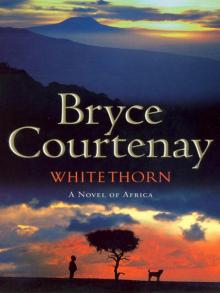 Whitethorn
Whitethorn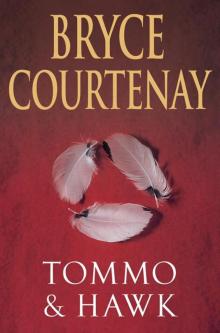 Tommo and Hawk
Tommo and Hawk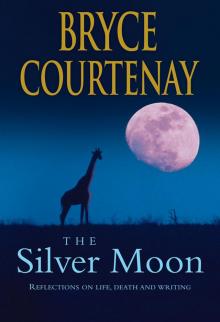 The Silver Moon
The Silver Moon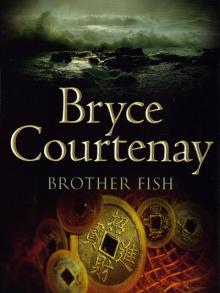 Brother Fish
Brother Fish FORTUNE COOKIE
FORTUNE COOKIE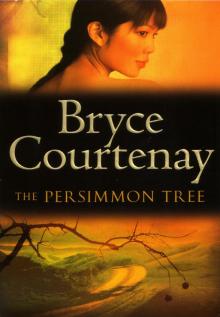 The Persimmon Tree
The Persimmon Tree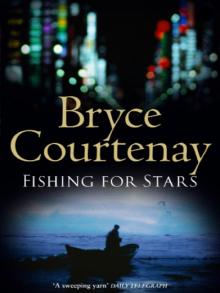 Fishing for Stars
Fishing for Stars